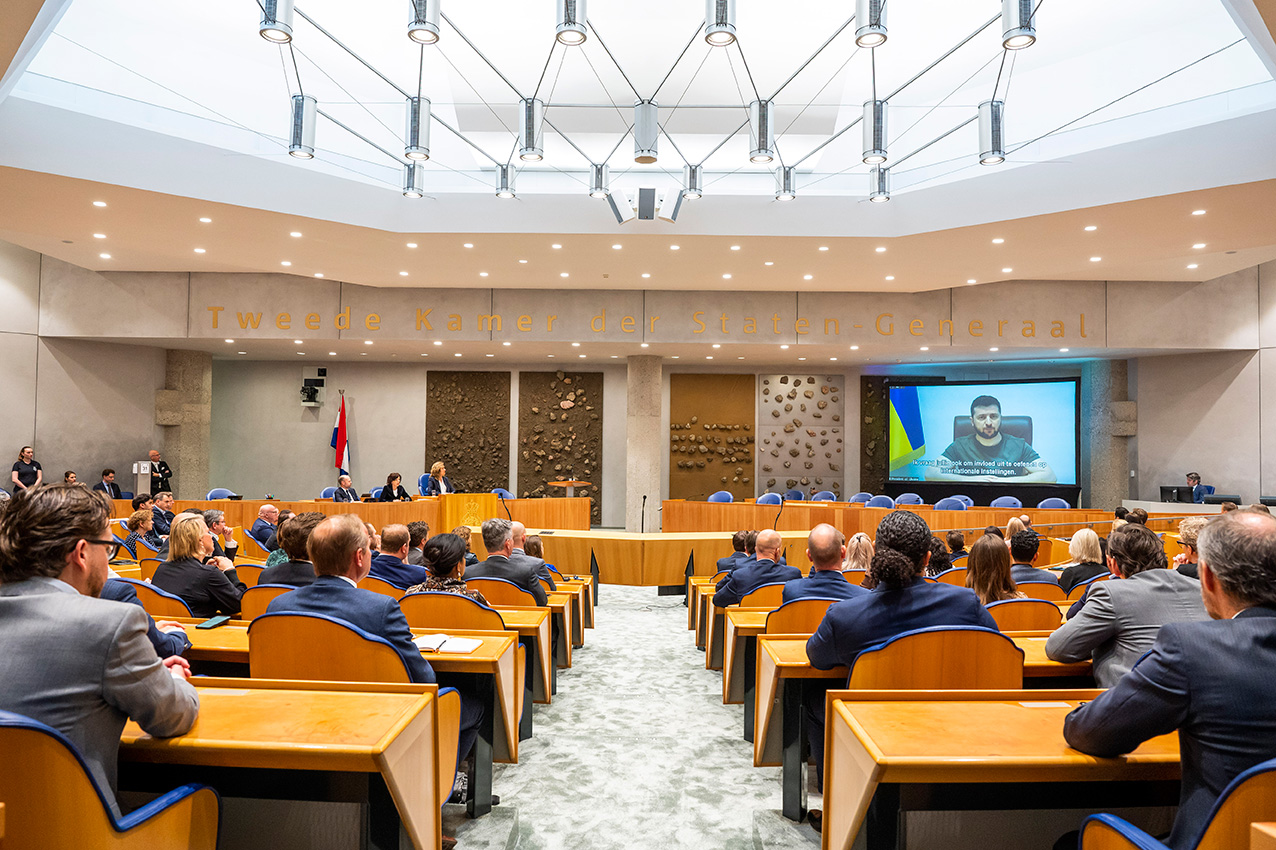Address on request
On Thursday 31 March, Ukrainian President Volodymyr Zelensky addressed the House of Representatives via a live video link. It was the first time that a foreign Head of Government had addressed the House in a plenary session, and also the first time that a Head of Government had requested this himself. The run-up to this première proved to be an intensive and interesting period of professional preparation for parliamentary reporters in order to cover this speech, in words, with live subtitles and in sign language.

The reason for the speech was a bitter one. It lay in the Russian invasion of Ukraine launched in the early morning of Thursday 24 February, an act which the Russians described as a “special military operation”. Partly as a result of this, the Chamber President, Vera Bergkamp, had a meeting with the Ukrainian ambassador to the Netherlands, Maksym Kononenko, on Friday 18 March. This conversation took place at his request. The ambassador said that Ukrainian President Volodymyr Zelensky had been addressing Parliaments of several countries via video link in recent weeks, including Germany, Sweden, France, Japan and Italy. President Zelensky requested that the House of Representatives be addressed in this way as well. President Bergkamp presented the request to the House of Representatives. On Tuesday 22 March, the House voted in favour of this.
Preparations started immediately. During a first internal official consultation, it became clear that the Parliamentary Reporting Office (PRO) had to take care of the regular reporting, including live subtitling and sign language. An additional challenge lay in the language of the speech; President Zelensky usually keeps it in his mother tongue, Ukrainian. It also became clear that, given the situation, the greatest possible confidentiality had to be observed in the preparations. After all, the president called in from a country at war.
Vetted
In the preparation of the PRO, a lot of attention was paid to live subtitling and sign language. After all, in this particular instance, standard business operations would not suffice. For the verbatim report, the Hansard, there was no great challenge. A Dutch translation had to be made as soon as possible after the speech, which would then be included in its entirety in the Hansard.
In case of the live subtitles, the search was for an experienced, professional Ukrainian-Dutch interpreter or translator. Unfortunately, but not unexpectedly, there is no live subtitler in the ranks of the PRO who has mastered Ukrainian. The sought-after translator was to translate the Dutch part of the meeting for President Zelensky into Ukrainian and the Ukrainian part for the Dutch Parliament into Dutch, which would follow the speech on a large screen in the plenary hall. These subtitles could also be seen on the live stream of the Dutch Parliament and in the TV broadcast by the public broadcaster.
After an interpreter with the correct credentials was finally found, the next problem arose. There were concerns from the Ukrainian side about the interpreter’s independence. After all, there are pro-Russian Ukrainians and also Russians who have mastered Ukrainian. The Ukrainians therefore wanted to make sure in advance that the person found could receive their approval. The interpreter who had lived in Kiev had to be vetted. Luckily, he got the green light. The final arrangement consisted of the interpreter doing his work not at the Dutch Parliament in The Hague but in a specially equipped studio in Hilversum, the Dutch broadcasting capital. The delay in the broadcast could be limited to 30 seconds (Ukraine to Hilversum to The Hague), which was enough for the interpreter to produce the subtitles.
A special sign
In the case of sign language, it was more easily possible to use standard working practice and the sign language interpreters who have been working with good results for the Dutch Parliament for some time. Yet in practice, it was not quite business as usual. The challenge here again was in the use of the Ukrainian language. A sign interpreter is used to working with a source that is both heard and seen at the same time. However, the Dutch professional sign language interpreters usually have no knowledge of Ukrainian. How were we to solve this? It was already known that Dutch subtitles would be used. However, it is difficult, and not common practice, to read and sign at the same time. The solution turned out to be as simple as it is obvious: an employee reads out the Dutch subtitles and thus acts as a replacement source for the sign language interpreter.
Zelensky or Zelenski?
Another issue arose during the preparation. Spelling is an important topic in times of war. In Dutch and Flemish media, for example, the capital of Ukraine is unanimously referred to as Kiev (the Russian spelling). The spelling of the name of the president of Ukraine is less unambiguous. Major newspapers write Zelensky (the Ukranian spelling); other leading media use Zelenski as their spelling (Russian). So the question arises: “Zelensky” or “Zelenski”? Reports in Dutch and Flemish media show that, for example, place names in Ukraine are spelled in different ways, such as Kiev and Kyjiv or Lugansk and Luhansk. The cause lies in the source language: Kiev is the Russian name and Kyjiv the Ukrainian. Ukrainian and Russian are related languages, but they have developed independently. The Ukrainian vocabulary therefore has more similarities with Polish than with Russian vocabulary. Some vowels and consonants are pronounced differently in Ukrainian than in Russian. As an exception, in the Dutch media, the Russian spelling is common for Kiev and Chernobyl, as these names became established during the time of the Soviet Union (van der Sijs 2022).
Not so when it comes to spelling the last name of the president of Ukraine. The choice is between the Russian spelling, Zelenski, and the Ukrainian, Zelensky. For the sake of convenience, we ignored the fact that the official website of the president himself maintains “Zelenskyy”. Internationally, the usual spelling seems to be “Zelensky”. This approaches the Ukrainian spelling and deviates from the Russian spelling. In the light of the ongoing conflict, it seemed inadvisable, linguistically speaking, to stick to the Russian spelling. In the light of this, we chose “Zelensky” as the official formulation.
Thursday 31 March
On the day itself, all the preparations paid off. Only the colleagues from the technical service had some difficult moments when it took quite some time before the live video link with Ukraine was established. In addition, there was also the usual user criticism. For example, users with knowledge of the Ukrainian language were quick to point out that the live subtitles were “incorrect and incomplete”. Just like live interpreting or translating at a conference, live subtitling is labour-intensive work that requires a lot of concentration. The interpreter does his or her best to convey as much of the original message as possible, but something is always left behind. In other words, completeness is a goal that is difficult to achieve. The lesson for the PRO is that it is essential to communicate via different channels (eg social media) what the practice of live subtitling entails in such cases. In this case, the problem was addressed by including the full translation of Zelensky’s speech into Dutch in Hansard and also publishing it on the website of the Dutch Parliament. Afterwards, the Chamber President thanked the Chamber staff who made this “special and historic moment” possible. The applause sweetened the bitter for a moment.
Henk-Jan Eras is a Quality Officer in the House of Representatives of the Netherlands. He is also a member of Tiro’s editorial team.
Reference
van der Sijs, Nicoline 2022: Kiev of Kyjiv? De spelling van Oekraïense plaatsnamen. One Taal.





[…] Henk-Jan Eras:A Bittersweet Première: Reporting President Zelensky’s Speech to the Dutch Parliament […]
[…] Henk-Jan Eras:A Bittersweet Première: Reporting President Zelensky’s Speech to the Dutch Parliament […]